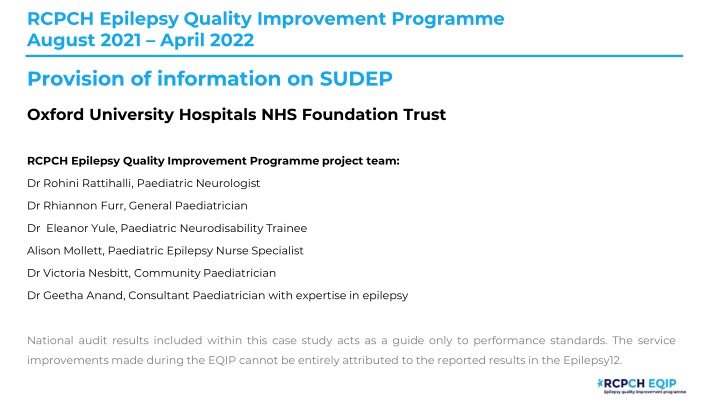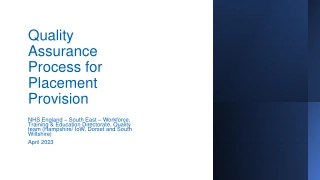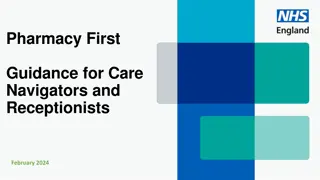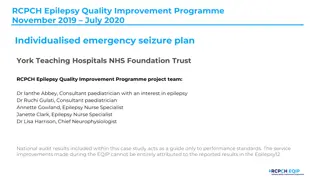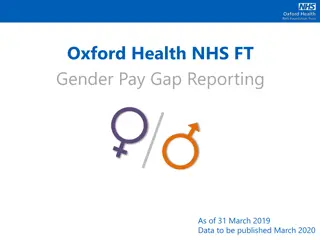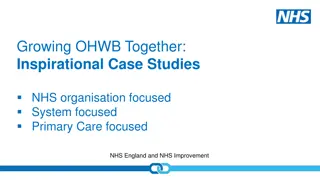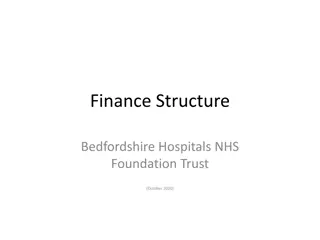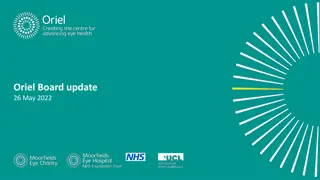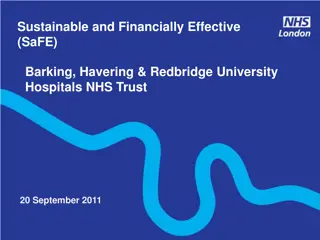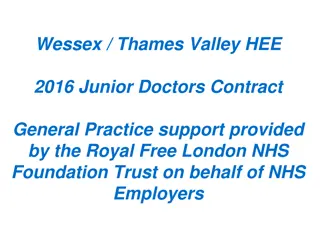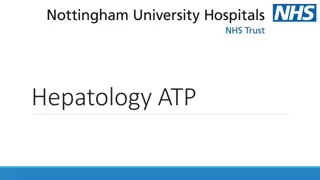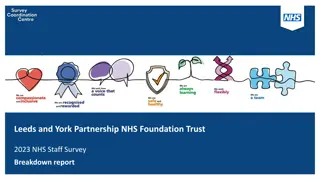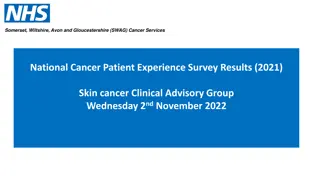Provision of Information on SUDEP - Oxford University Hospitals NHS Foundation Trust
Provision of standardized toolkit for clinicians to discuss SUDEP with families of children with epilepsy, aiming for at least 80% participation. Project focuses on improving communication regarding SUDEP after a decline in 2020. Oxford team plans to create a care plan incorporating a specific SUDEP discussion toolkit.
Download Presentation

Please find below an Image/Link to download the presentation.
The content on the website is provided AS IS for your information and personal use only. It may not be sold, licensed, or shared on other websites without obtaining consent from the author.If you encounter any issues during the download, it is possible that the publisher has removed the file from their server.
You are allowed to download the files provided on this website for personal or commercial use, subject to the condition that they are used lawfully. All files are the property of their respective owners.
The content on the website is provided AS IS for your information and personal use only. It may not be sold, licensed, or shared on other websites without obtaining consent from the author.
E N D
Presentation Transcript
RCPCH Epilepsy Quality Improvement Programme August 2021 April 2022 Provision of information on SUDEP Oxford University Hospitals NHS Foundation Trust RCPCH Epilepsy Quality Improvement Programme project team: Dr Rohini Rattihalli, Paediatric Neurologist Dr Rhiannon Furr, General Paediatrician Dr Eleanor Yule, Paediatric Neurodisability Trainee Alison Mollett, Paediatric Epilepsy Nurse Specialist Dr Victoria Nesbitt, Community Paediatrician Dr Geetha Anand, Consultant Paediatrician with expertise in epilepsy National audit results included within this case study acts as a guide only to performance standards. The service improvements made during the EQIP cannot be entirely attributed to the reported results in the Epilepsy12.
Provision of information on SUDEP - Oxford University Hospitals NHS Foundation Trust Project aim: To standardize a toolkit for clinicians to use for providing information on Sudden Unexpected death of someone with Epilepsy (SUDEP) to families, to enable a personalized yearly discussion on SUDEP with at least 80% of children with epilepsy. Background: In 2019, the Epilepsy12 audit data for Oxford Teaching Hospital Trust results showed that the service was close to achieving the national average (44%). Trust results revealed that 40% of families felt that they were having conversations around SUDEP and that Oxford Hospital was providing families with the information. However, in 2020, there was a decline in response from 40% to 29%, which meant Oxford's was below the national average, suggesting that the Trust was not able to provide information on SUDEP to children and their families. However, audit results from 2020 do not identify the impact of COVID-19 or the consequences of the pandemic, which may have impacted the data. Area of focus: The Oxford team plans to create a care plan that incorporates a toolkit specifically for the SUDEP discussion.
Provision of information on SUDEP - Oxford University Hospitals NHS Foundation Trust Driver Diagram
Provision of information on SUDEP - Oxford University Hospitals NHS Foundation Trust Changes: Test draft text with stakeholders was completed on 21/10/21 at the Oxford regional epilepsy meeting. Test various ways of sharing and saving drafts for the project. The first draft of text is being edited. Discussion with stakeholders (fellow consultants) is ongoing.
Provision of information on SUDEP - Oxford University Hospitals NHS Foundation Trust Results: Findings from a brief survey at a regional meeting: 7 respondents o 5 found the content aboutright, 2 not detailed enough. o 5 out of 7 rated the statement this will be useful : agree or strongly agree o 6 out of 7 rated it useful to have as an Electronic Patient Record (EPR) smart phrase. o Some queries were signposted to hyperlinks to Epilepsy Action sites for information on sleep monitoring systems. Tested draft of text with stakeholders completed on 21/10/21 at Oxford regional epilepsy meeting. Consulted with national charity SUDEP Action, who advised edits. Tested various ways of sharing and saving drafts for the project. Attended EQIP Using Data to Drive Change training session, which informed the team's decision to move to qualitative data collection and embed rapid feedback sessions in monthly or bi-monthly updates to governance. Feedback from SUDEP Action received and acted upon: lay language is essential, and have addressed this. Provided clarification that this is a package of information for clinicians to use at their discretion, tailored to their patients.
Provision of information on SUDEP - Oxford University Hospitals NHS Foundation Trust Results: January 2020: The text has gone through several iterations and has been honed. Discussion with stakeholders (fellow consultants, Epilepsy Action, and SUDEP Action) had been helpful. Feedback from the focus group (1 nurse specialist, 1 general paediatrician, 5 paediatric neurologists, and 1 trainee): What matters most? Content and Approach o How these are handled depends on whether New diagnosis 1. Follow-up is well controlled. 2. Follow up, drug-resistant 3. Discussed the risk of Sudden Unexpected Death in Epilepsy (SUDEP). Some key points that were raised were: SUDEP is when someone with epilepsy dies suddenly, and prematurely, and no cause of death can be found. o It is not a condition itself, but a way to categorise these sudden deaths. Overall, people living with epilepsy are at a 1 in 1000 risk of SUDEP per year, but risk is specific to each o individual, and ways to reduce risks are person-centred too. People with learning disabilities, other physical conditions, or rare epilepsies may be at higher risk. Different types of epilepsy carry their own level of risk, some higher, some lower. o
Provision of information on SUDEP - Oxford University Hospitals NHS Foundation Trust Results: Epilepsy with generalised tonic-clonic seizures has a higher risk. This is especially true if these happen at night or when asleep. An increased number of seizures also increases the risk. People with absence or myoclonic seizures are not known to have an increased risk for SUDEP. Epilepsy risks (linked to dying prematurely) can change over time. However, steps can be taken to reduce some of these risks. CTD: Discussed things we can do to help reduce the risk of SUDEP. These could include: Getting better control of your epilepsy to reduce the number of seizures, where possible, o Taking your epilepsy medication regularly and as prescribed o Following safety advice and lifestyle measures o Using epilepsy monitors may help to better detect night-time seizures; however, these should be part of a o wider safety plan to reduce epilepsy/SUDEP risks. How girls of childbearing age will need to have pre-conception counselling to help understand the risks o related to this, and how if you take certain medications, they may need to be reviewed or changed as you get older. The EpSMon app can help people 16 and older monitor and manage their epilepsy risks o (www.sudep.org/epsmon).
Provision of information on SUDEP - Oxford University Hospitals NHS Foundation Trust Approach As we have discussed before- SUDEP risk remains low/moderate/high When you read you will come across SUDEP- I think I should show you this before you come across it..... Using the term SUDEP not synonyms/allusions to it is vital Risks are all around us- like driving on a motorway. We have some control in modifying some of those risks, like wearing a seatbelt....
Audit results cohort 3/4 - Provision of information on SUDEP - Oxford University Hospitals NHS Foundation Trust Percentage of children with evidence planning of care encompasses of information on SUDEP in 2021 was 35% which increased to 58% in 2022, above national average. Percentage of CYP with evidence of planning of care that encompasses provision of information on SUDEP of that provision 100% 90% 80% 70% 60% 50% 40% 30% 20% 10% 0% 2019 2020 ORENG 2021 2022 RTH England & Wales 2019 2020 2021 2022 2021 ORENG 2021 England & Wales 2022 ORENG 2022- England & Wales 40% 29% 35% 58% 58% 53% 75% 56% Percentage of children with evidence of planning of care that encompasses provision of information on SUDEP:
Audit results cohort 3/4 - Comprehensive care planning- Oxford University Hospitals NHS Foundation Trust Oxford university hospital continues to routinely undertake comprehensive care planning for children with epilepsy year on year. The percentage of children with documented evidence of discussion for care planning have increased in all core elements of care planning in 2022, compared with results in 2021 , achieving above regional and national averages. 2019 2020 2021 2022 Percentage of children with documented evidence of discussion of: 2021 ORENG 2021 England & Wales 2022 ORENG 2022- England & Wales Core elements of care planning 55% 63% 62% 81% 74% 75% 84% 79% 83% 100% 88% 100% 91% 92% 91% 93% Parental prolonged seizures care plan Water safety 75% 85% 83% 84% 89% 84% 90% 84% First aid 75% 90% 93% 100% 87% 87% 94% 91% General participation and risk 80% 85% 93% 97% 95% 85% 93% 86% Service contact details 65% 63% 78% 94% 90% 93% 96% 95%
Audit results cohort 3/4 - Comprehensive care planning- Oxford University Hospitals NHS Foundation Trust The percentage of CYP with evidence of communication regarding elements planning increased. Percentage of CYP with documented evidence of communication regarding core elements of care planning 100% 5 of core care has 80% 60% The percentage of CYP with evidence of communication regarding element planning has increased since 2019. 40% 20% each care of 0% 2019 2020 2021 2022 Prolonged seizures Water safety First aid General participation and risk Service contact details Core elements
Provision of information on SUDEP - Oxford University Hospitals NHS Foundation Trust Challenges: The team identified the decline in their 2020 audit results for several reasons: COVID-19 o Avoidance culture around SUDEP. o Not having a specialised resource on SUDEP that they could tap into that was tailored for their trust itself. o Lack of quantitative data so far; hope to see an impact in Epilepsy 12 next round. o Discussing SUDEP at every consultation is not always possible. This needs to be worthwhile for the patient and family, not just a tick box.
Provision of information on SUDEP - Oxford University Hospitals NHS Foundation Trust Outcomes: Despite the pressures of working in the pandemic, the team has created a resource that aims to have a clear plan to embed in practice. The team has increased good communication via email and WhatsApp and has taken opportunities to attend the BPNA webinar on SUDEP and disseminate the learning, which helped ensure the content of the text is appropriate. The lead consultant continues to collaborate with SUDEP Action to create a paediatric SUDEP checklist resource to give guidance to other paediatric epilepsy specialists with a practical tool to ensure that the conversations with their patients and families cover all the required information. Achieved buy-in from service users and staff using the resources created. The qualitative feedback captured showed the attitude towards discussing SUDEP in the Trust is shifting. National audit results showed that the percentage of children with evidence of planning of care that encompasses the provision of information on SUDEP in 2021 was 35%, which increased to 58% in 2022, above the national average. The team continues to routinely undertake comprehensive care planning for children with epilepsy year after o year. The percentage of children with documented evidence of discussion for care planning increased in all five core elements of care planning in 2022, compared with results in 2021, achieving above regional and national averages.
Provision of information on SUDEP - Oxford University Hospitals NHS Foundation Trust Lessons learnt: Being a part of EQIP has provided the sharing of good ideas to be implemented elsewhere within the service. Making even small changes takes time. There is value in qualitative data driving change. The QI principles gained on this programme have led to the creation of a really useful local resource for SUDEP information and will continue sharing and honing it. Additional helpful information is available below. https://sudep.org/sudden-unexpected-death-epilepsy-sudep https://sudep.org/childhood-adolescence-and-risk (Free leaflets from SUDEP Action on reducing Epilepsy risks and SUDEP for children with epilepsy are available here: https://sudep.org/leaflets-and-downloadable-information ) https://www.epilepsy.org.uk/info/daily-life/safety/practical-guidance https://www.epilepsy.org.uk/info/daily-life/safety-aids-equipment/alarms-monitors Visual presentation of team project intervention Team poster Team presentation
Provision of information on SUDEP - Oxford University Hospitals NHS Foundation Trust Team update in 2023 Since the EQIP, the team has shared examples of their project content and approach, which have been launched on their internal shared drive. Continues to create awareness amongst internal departments by presenting their project at a paediatric governance meeting. Continues to share and create SPREAD amongst peers and colleagues by presenting at ORENG network meetings. Working with SUDEP Action, the complete children s seizure safety checklist will be released and made available early next year. Video recording of presentation update
https://eqip.rcpch.ac.uk eqip@rcpch.ac.uk @RCPCHEQIP
